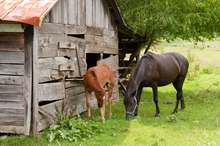According to Kentucky Equine Researchers, various studies have investigated the benefits of feeding yeast to horses. Among the positive results of dietary yeast supplementation are better digestion of fiber; limitation of undesirable changes in the intestinal ecosystem; and reduction in variations in lactic acid concentrations and pH levels after large grain meals.

Dietary yeast for horses?
Among the positive results of dietary yeast supplementation are better digestion of fiber and limitation of undesirable changes in the intestinal ecosystem.
A recent study in Argentina examined the effects of Saccharomyces cerevisiae supplementation on the closure of articular growth plates in young horses. In growing horses, yeast increased the digestibility of ADF, NDF, calcium, phosphorus, and zinc.
Some studies showed an increase in wither height and weight gain in yeast-supplemented weanlings, though the results of other research did not support these findings. Some research in yearlings indicated yeast supplementation led to higher plasma level of lysine and methionine, supporting the production of muscle tissue.
Finally, yeast was linked to a 5 to 15% increase in milk production in mares, with the milk showing higher levels of energy and some amino acids.
A recent study in Argentina examined the effects of Saccharomyces cerevisiae supplementation on the closure of articular growth plates in young horses.
Quarter Horse fillies were put into two groups and were given standard diets and either 0 or 20 grams of live yeast daily from 8 to 24 months of age. Growth plate closure was determined by radiographs at 8, 12, and 24 months of age. Blood and urine samples were also analyzed to evaluate bone and mineral metabolism parameters.
Distal metacarpal growth plates were half closed or fully closed in 84% of fillies at 8 months old. By the time the fillies were 24 months old, there was a positive but nonsignificant effect on closure of distal radius growth plates in the live yeast group.
Bone markers at 24 months of age did not differ between the two groups, but some individual horses in the yeast group showed positive effects. From this research, it can’t be concluded that live yeast supplementation of foals has any significant effect on skeletal maturation.
In addition, in an effort to determine the effect of yeast on digestion in horses, researchers in France carried out a study to look at the influence of feeding a preparation of Saccharomyces cerevisiae, a strain of yeast, on
microbial profiles and fermentation patterns in the large intestine of horses fed a high-fiber or a highstarch
diet.
To provide adequate energy for their work, horses performing a high level of exercise are often fed large
amounts of cereal grains. At the same time, these horses may be given low levels of forage.
This type of dietary management increases a horse’s risk for colic and laminitis because the small intestine’s ability to digest starch may be overwhelmed by the sizable grain meals. If this happens, undigested starch reaching the cecum may seriously upset the activity of the bacteria that normally populate this organ and aid in
digestion.
Any management technique aimed at minimizing such an upset is desirable because it enables feeding high-grain diets without risking digestive and metabolic upsets. Supplementing the horse’s diet with yeast may be one way to avoid changing the balance of microbes, thereby keeping fermentation at a normal level.
